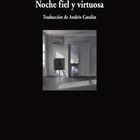"Beauty dies: that is the source of creation", says Louise Glück (1943) in her great poem 'Jacinto' (the flower, not the proper name), which belongs to her book
Ararat
(1990, published in Spanish by Pre -Texts, like all the previous ones until the one we review now, edited by Visor).
In another poem from that same book, 'Parodos', we read: “He was born with a vocation: / to bear witness / to the great mysteries”.
Later, in his book
Averno
(2006), in Pushkin's fabulous poem that he adapts, entitled 'Omens', we read that poets start from “endless impressions”, to which they “surrender with all their being” “making, in silence, a mere event an omen / until the world reveals the deepest needs of the soul ”. Perhaps here we have essential keys to understanding the poetry of this great American poet, Louise Glück, heiress to Emily Dickinson, Elizabeth Bishop and Sylvia Plath and a Nobel laureate last year.
It is true that endless impressions swarm through Glück's entire poetry and give it a constant air of mystery, whether its origin is the familiar universe - decisive in this poet -, whether it is love - equally decisive - or nature, omnipresent. in all seasons, acutely trapped with a clean and precise language and with incessant airs of intertwined and chained haikus, making that magical universe penetrate all the human interweaves that are explored in these poems.
All this happens from his first book,
Primogénito
(1968), to the last one he has published, this
Night faithful and virtuous
(2014), going through another 10 works, of which it would be difficult to highlight some, given the high quality of all .
What is certain is that
Una vida de pueblo
(2009), his penultimate book, announces a breadth in the versification that, in a way, preludes what we find in
Noche fiel y virtuosa,
recently published in Spanish and excellently translated by Andrés Catalán.
From the outset, it is a great book, with the symbolism of the night in between - and dark night, in addition, but also "faithful and virtuous" - and that participates in those universes already mentioned (the family universe, the universe of the love, the universe of nature).
But there are some new things in this work that must be highlighted.
cover 'Faithful and virtuous night', LOUISE GLÜCK.
EDITORIAL POETRY VIEWEREDITORIAL POETRY VIEWER
On the one hand, the autobiographical dimension - evident in most of his poetry - is partially blurred by resorting to clearly fictional settings and characters, like that painter -
alter ego
of the author— who lives creation with anguish: “And I spoke to him of the emptiness of my days, / and of time, which was beginning to run out, / and of the insignificance of my achievements” ('The melancholic assistant'). In the proximity of death, this creator puts his entire work on trial: “In fact, my feelings have haunted me; / It is the gift of expression that has sometimes failed me. / Failed, tormented, practically all my life ”('Closeness of the horizon'). Of course, the family obsession does not disappear through this character —and others—, as in the wonderful poem 'Midnight', another trip to the past, as there are so many in Glück's entire poetry. In it contemplation appears as a motor in the appropriation of the surrounding world, something essential in this poet: "And that was her reason for being, contemplation." Without this crucial mechanism,you cannot understand the splendor of nature that is in his poetry.
On the other hand, the temporary territory that definitively takes over this book is from the end glimpsed, with that omnipresent night and those dreamlike reappearances of their dead parents, to demand attention or care: “We read your books when they get to heaven. / Just a mention of us ”. Answer: “I write about you all the time. / Every time I say 'I', I mean you ”('Visitors from outside'). And after death, what? He also harasses this question in the poem 'Epilogue': “Will I rise from the dead ?, / asks the soul… / And the sun says yes. / And the desert responds: / your voice is sand scattered in the wind ”.
And then there are the prose poems, new to Glück, that encourage the fictional spirit in this book, along with its symbolic and allegorical dimension. Small allegories of life are these micro-stories, with those trips of Kafkaesque roots at times, where both childhood and old age come together in an oppressive sensation of sterility and failure. The epitome of all this is the first poem of the book, 'Parabola', in which, however, a certain hope rises - so difficult in this book - because in it a philosophy of life that confronts that sterility and that emptiness, so overwhelming and frequent. Between opposing options of different pilgrims, in the end in that poem quoted the idea that the truth is found in the day to day creeps in,in that miraculous immobility of the simple where "we had changed even though we had never moved" and where "I felt (we) that / we should continue to be free" "in order to know the truth" (the truth of the simple that takes place in the the course of any given day, the maximum immobility and the maximum truth within our reach. The rest is smoke).
In short, a great book by a great poet, not one of the most vaunted in fashion circles, as Patti Smith made clear: "Louise Glück?"
"I have not read a single line of yours."
All he had to do was say: "I don't know who he is."
Faithful and virtuous night
Louise Glück.
Translation by Andrés Catalán.
Viewer, 2021.
182 pages.
15.20 euros.
Look for it in your bookstore
You can follow BABELIA on
and
, or sign up here to receive
our weekly newsletter
.

